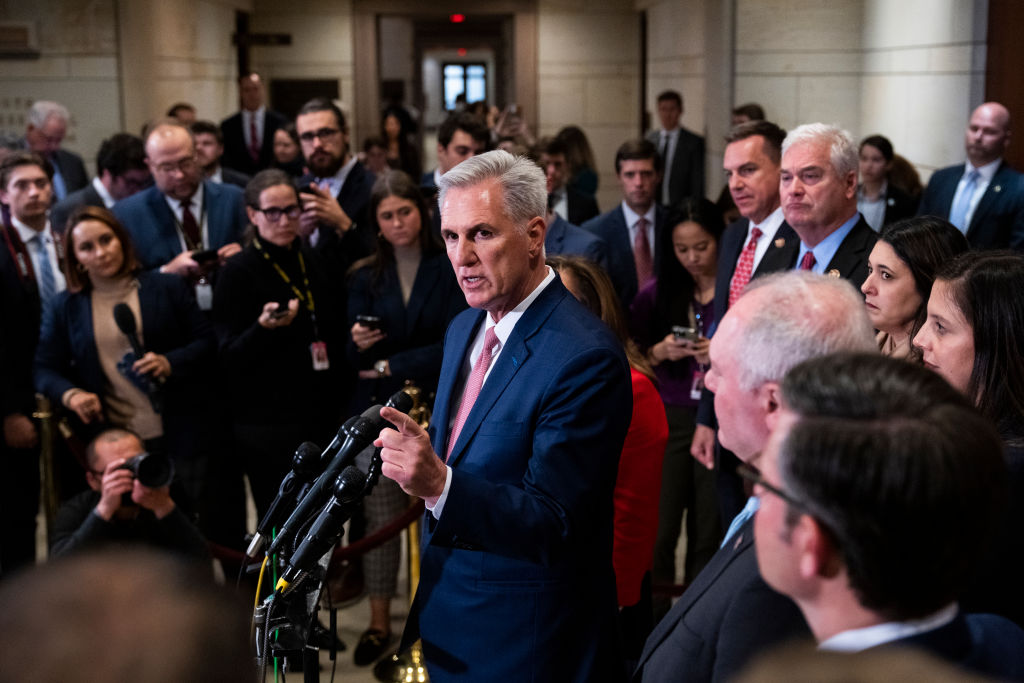When the 118th Congress convenes for the first time on January 3, the wrangling will begin almost immediately—and there is little evidence that it will let up. This reality has left centrist Republicans wondering whether their deeply divided party can produce any meaningful legislation over the next two years.
House Republicans have already said they plan to prioritize investigations of the origins of COVID-19, the Biden administration’s chaotic Afghanistan withdrawal, and Hunter Biden’s business dealings, among other issues. Turning legislation into law will be much harder: Even if House Republicans’ now 222-member conference can agree on a bill, it will still need President Joe Biden’s signature along with support from a narrowly blue Senate.
“If you pass legislation out of here, and it can’t pass a Democrat-controlled Senate, then you’ve done nothing for our country,” socially moderate GOP Rep. Nancy Mace said in a recent interview. Mace has stood apart from most House Republicans on a number of issues, including the Respect for Marriage Act and the House-passed Right to Contraception Act.
Mace maintains that her independent-minded approach to policy issues is the reason she carried her swing district by 14 points in an otherwise lackluster midterm cycle for her party. “Leadership will need to look at the positions of more centrist-minded Republicans in order to be successful,” Mace said.
But House Republicans like Mace will be competing with hard-line members of their conference also jockeying for power—and opportunities to buck establishment figures like Republican Leader Kevin McCarthy. Next week, that means threatening to derail the Californian’s speakership bid.
McCarthy needs 218 votes to win, though “present” votes or absences would lower that number. Currently, even five no-votes would trigger at least a historic second round of voting for the first time in 100 years: Only 14 House speakership elections in American history have gone to multiple rounds of votes, 13 of which preceded the Civil War.
Centrist Republicans have spent recent weeks campaigning for McCarthy with the message that they will not let a handful of members push them—on January 3 and beyond.
“They’re undermining the whole conference, and they’re strengthening the hand of Hakeem Jeffries,” GOP Rep. Don Bacon said in a recent interview of House Democrats’ newly elected leader. “If we don’t act as a team, that forces the leader to have to get some Democrats on board on any bill.” He’s threatened to work with centrist Democrats to elect a moderate alternative to McCarthy if prospective defectors refuse to get in line.
One area of contention heading into next year is the Freedom Caucus’ preoccupation with reinstating a rule called the “Motion to Vacate the Chair,” which would allow any member to bring up a vote to oust the speaker at any time. The rule’s existence at the time precipitated former Speaker John Boehner’s resignation as speaker in 2015.
Fiscal hawkishness also remains a sticking point for the right-most flank of the party next year. Before Congress passed the $1.7 trillion omnibus government spending package last week, for example, 13 hardline House Republicans vowed in a December 19 letter to “oppose and whip opposition to any legislative priority of those senators who vote for this bill including the Republican leader.”
The strategy quickly paid dividends. McCarthy slammed the package, which had been championed by Republican Sen. Mitch McConnell and others. “This is one of the most shameful acts I’ve seen in this body,” McCarthy said of the omnibus package on the House floor ahead of the vote.
That rhetoric worked while Democrats controlled the House and stakes were low for McCarthy. But if he manages to clinch the speaker’s gavel next year, McCarthy will have to find ways to work with members who represent swing, or even modestly Republican, districts.
One member to watch is Rep.-elect Anthony D’Esposito, who flipped a Democrat-held seat Biden carried by 14 points in 2020. “The reason why we prevailed was that a lot of moderate Democrats felt especially that their party was just too far to the left, and we appealed to a lot of the independents,” D’Esposito said in a recent interview. “If you govern too far to the right or too far to the left, you’re not going to be in this job very long.”
Newly elected swing district Democrats voice similar concerns about what the next Congress will look like. Take Rep.-elect Marie Gluesenkamp-Perez, an auto shop owner and Second Amendment-supporting rural Democrat who in November ousted GOP Rep. Jaime Herrera Beutler in Washington’s Republican-leaning 3rd Congressional District.
“Extremists don’t pass bills,” Gluesenkamp-Perez said in a November interview. “You need to be able to build a coalition to do that.”







Please note that we at The Dispatch hold ourselves, our work, and our commenters to a higher standard than other places on the internet. We welcome comments that foster genuine debate or discussion—including comments critical of us or our work—but responses that include ad hominem attacks on fellow Dispatch members or are intended to stoke fear and anger may be moderated.
With your membership, you only have the ability to comment on The Morning Dispatch articles. Consider upgrading to join the conversation everywhere.